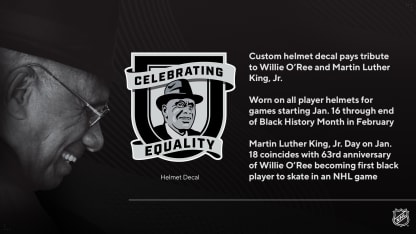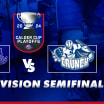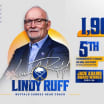James became the NHL's first Black player born in the United States when he made his debut with the Sabres on November 1, 1981. Born in Florida and raised on Long Island, where he learned to skate as a teenager, James developed a reputation as one of the toughest fighters in professional hockey.
"When you're persevering through uncharted territory, there are going to be a lot of people that are going to come out to your aid to help you, and in my case that's exactly what happened," James told NHL.com. "I appreciate all the help these people gave me because they took a hell of a chance coming out to help a Black person at that point in time."
James skated in 10 NHL games, including three in the Stanley Cup Playoffs, with Buffalo in 1981-82, and another four regular-season games with the Toronto Maple Leafs in 1986-87.
In 1983, he scored the goal that clinched the Calder Cup Trophy for the Rochester Americans.
"Val James advanced the sport of hockey in a very important way," Sabres president Kim Pegula said on the anniversary of James' achievement last year. "As we work to create greater opportunities for people of all backgrounds across all walks of life, we continue to be influenced by Val's accomplishments. We are proud to have him as a member of the Buffalo Sabres family."
The organization is working with the club's S.C.O.R.E. ball hockey program to award 10 scholarships to the Sabres' Learn to Play program in James' honor to give kids their first opportunity to play hockey.
"Val James once said that he never thought of himself as a trailblazer - but the entire hockey world should recognize that he is one," Kim Davis, NHL senior executive vice president, social impact, growth initiatives and legislative affairs, said. "As the first Black American player to make the NHL, Val has inspired Black boys and girls across the United States to play hockey and to follow their dreams."
He detailed his experiences in his memoir *Black Ice* with John Gallagher.




















